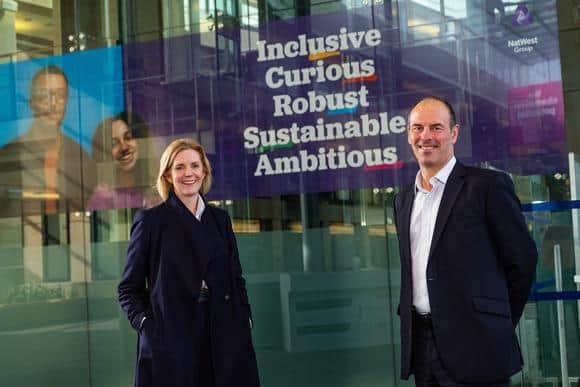RBS staff to tap into £1.5m training to help firms make most of net zero shift
and live on Freeview channel 276
Under the three-year deal, the university will help deliver a training programme to more than 16,000 staff with other experts also being drafted in to provide specialist input on key business areas including manufacturing and retail.
The training aims to help Scottish business customers identify opportunities from the move to a net zero economy, as well as helping them become more sustainable.
Advertisement
Hide AdAdvertisement
Hide AdThe announcement comes in the wake of a report last year which estimated that the UK’s move to a lower carbon economy could open up £160 billion of new revenues for businesses.
Experts from the university’s Centre for Business, Climate Change and Sustainability will work with the bank specialists to deliver 12-week online education programmes to relationship managers and other staff.
Sector-specific climate training programmes across commercial real estate, retail and leisure and manufacturing will also be rolled out in collaboration with experts including real estate firm Cushman and Wakefield and the Warwick Manufacturing Group at Warwick University.
James Close, head of climate change for RBS’s parent company NatWest Group, said: “Climate education across the bank is central to us reaching our climate ambitions and the UK’s move to a net zero economy.
Advertisement
Hide AdAdvertisement
Hide Ad“This specialist training will provide the confidence for colleagues to step into climate conversations both within the bank and with customers. Increased knowledge will empower bank colleagues to help businesses across sectors roll out effective and credible transition plans as the UK heads towards a low carbon economy.”


Wendy Loretto, dean of the University of Edinburgh Business School, said the partnership will build on a close working relationship that it has developed with the bank In recent years.
“COP26 highlighted just how integral businesses are in this climate crisis, and collaborations such as this mark the great responsibility business schools have in ensuring their research translates to effective change. This partnership gives us the opportunity to ensure we are at the forefront of such change.”
Last year RBS delivered training to more than 13,000 staff with a focus on climate awareness, climate change and the agriculture sector.
Advertisement
Hide AdAdvertisement
Hide Ad“Feedback from training participants has been positive with some expressing how the training made them more aware of the bank’s commitment to climate change and making them proud to play their part in helping customers improve their awareness of what and how they can gain momentum on their own climate change journeys,” said Close.
A report published by NatWest last year said the UK’s six million SMEs could achieve 50 per cent of the UK’s net zero decarbonisation goals while opening up huge new revenue opportunities.
However the report revealed that less than 10 per cent of SMEs currently consider climate change a source of future growth.
Almost 90 per cent of UK SMEs also said they were unaware of their business’s total carbon emissions. However, around half of firms surveyed said they recognised it was important to lower their emissions in the near future.
A message from the Editor:Thank you for reading this article. We’re more reliant on your support than ever as the shift in consumer habits brought about by coronavirus impacts our advertisers. If you haven’t already, please consider supporting our trusted, fact-checked journalism by taking out a digital subscription: www.scotsman.com/subscriptions
Comment Guidelines
National World encourages reader discussion on our stories. User feedback, insights and back-and-forth exchanges add a rich layer of context to reporting. Please review our Community Guidelines before commenting.